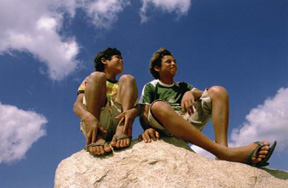Because We Were Born
Puisque nous sommes nés FRANCE, BRAZIL / 2008 / Portuguese / Color / 35mm (1:1.85) / 90 min
FRANCE, BRAZIL / 2008 / Portuguese / Color / 35mm (1:1.85) / 90 min
Directors, Photography, Sound: Jean-Pierre Duret, Andrea Santana
Editing: Catherine Rascon
Sound Design and Mix: Roman Dymny
Original Score: Martin Wheeler
Piano: Edda Erlendsdóttir
Sound: Daniel Deshays
Executive Producer: Muriel Meynard
Producer: Jamel Debbouze
Production Companies: Ex Nihilo, Kiss Films
Co-production: Mikros Image (Maurice Prost) World Sales: U Media
www.puisquenoussommesnes.com
The Pernambuco region of Brazil. Two young boys living outside the city. By night, they are perched on the ground by a gas station located at the intersection of roads that go on forever. Amid the trucks and buses sailing past, the discarded food, the travelers, we see the pair’s impoverished existence. And yet the two have dreams, and when they talk to each other, it sometimes sounds as if they are posing philosophical questions. Though they are of course only children, we see them as human beings living within a harsh reality, and we recognize the glimmer of hope that shines in their faces.
[Director’s Statement] This film is not a bleeding-heart or angelic portrait of poverty and violence in Brazil. It tells us the universal story of two kids trying to find their place in the adults’ world. They know there is no possible future where they were born. This quest for identity takes place in the deprived Brazil of the Northeast Region, but it could actually take place in any country.
What is surprising and touching with Nego and Cocada is the energy they put into escaping their destiny. They want to do something with their lives. Their language carries in itself what unites them. In the film, this language challenges that of the politicians—the words of Lula, also a native of this region, who campaigns at that time for his second term as president.
In the situation of economic segregation that exists in Brazil, the boys are among the invisible people, the value of whose lives is denied.
This is a film on the prowl, a watcher’s film. The two of us are there, but we never do any interviews. The proof of the boys’ trust lies in the intimacy to which they occasionally abandon themselves.
Cries of rage, the modulated calls of the goatherds, the rumble of horses’ hooves, the sounds of water, of truck horns, and of animals, the noisy and irregular breathing of a sick cow—the soundtrack also has a key role to play.
The sensations are too many for the limited frame of the camera to contain. But if we had no doubts, it would be best to refrain.
 (From the right)
(From the right)Jean-Pierre Duret Born in Savoie, France, in 1953, to a family of farmers. After years of working in the theater with Armand Gatti, Duret became a boom operator, then a sound engineer. He has worked sound for a large number of directors, including Maurice Pialat, Luc and Jean-Pierre Dardenne, Jacques Doillon, Agnès Varda, Andrzej Wajda, and Claude Chabrol. He directed his first documentary, Un beau jardin, par exemple in 1986. A fiction film, Les jours de la lune, followed in 1990. Andrea Santana Born in northeast Brazil in 1964, Santana first worked as an architect and urban planner. She began working in documentary film in 2000 with Jean-Pierre Duret. Duret and Santana codirected the documentaries, Romances de terre et d’eau (2001) and Le rêve de São Paulo (2004). Because We Were Born is the third film to result from this collaboration. |
